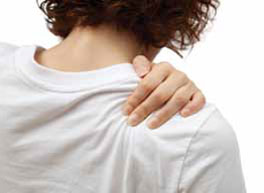
Those popping and crackling noises heard when you move your shoulder are normal, most of the time, but should these sounds and sensations be accompanied by pain, swelling and loss of joint function, you may be experiencing degeneration of the acromioclavicular (AC) joint. Smooth surfaces of the cartilage that line the shoulder degrade, and the joint begins to wear out. This condition, often caused by overuse, can become pronounced after the age of 50.
The shoulder is comprised of the clavicle (collarbone), the scapula (shoulder blade) and the humerus (upper arm bone). They come together at the shoulder joint, the most unstable ball and socket joint in the body. Because the arm bone is bigger than the shoulder socket it sits in, a large dependence on muscles and ligaments is required to keep the shoulder in place.
A sprain of the AC ligament may cause a minor shoulder separation that generally heals with rest, ice and compression, followed by exercise and medications to reduce pain and swelling, or surgery if other treatments do not work. A torn AC ligament increases the separation, and the popping and crackling sounds can be heard. Rotating your arm while your shoulder is separated causes the noises.
A second and increasingly more common cause for this condition is injury—more specifically, a sports-related injury. An impact to the shoulder joint, such as might occur during a fall or body-to-body contact, has the potential to displace the arm bone from the shoulder socket. The more significant the impact, the greater the chance the injury results in some form of separation.
To treat a shoulder separation, we can design a rehabilitation exercise program that increases the range of motion while strengthening the muscles around the shoulder. Stronger muscles in this area increase stability, lessen the stress on the ligaments and offer preventive measures to help avoid a repeat injury.
If the clicking noises announce your presence in a room, chances are they will stick around unless you seek our advice. The sooner you do that, the better able we will be to help improve your shoulder.









